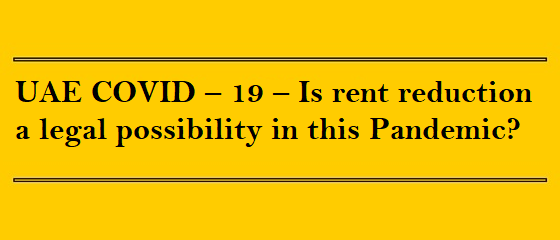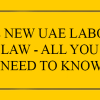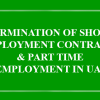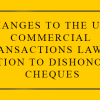UAE COVID – 19 – Is rent reduction a legal possibility in this Pandemic? – This topic will cover whether the residents of UAE have any respite in the rents of their commercial and residential spaces amidst these distressing situations. This information is for general knowledge only and specific legal advice must be taken before acting or refraining from acting in any of the situations.
All of us are aware that most of the commercial establishments are working under reduced capacity which in turn has resulted in the loss of sales, loss of income, unpaid leaves to employees, and in some cases even loss of jobs. This has resulted in tenants demanding from their landlords to reduce or waive off the rents for some period.
But before going deep into the topic the tenants must acknowledge that the landlords have the postdated cheques of the tenants which they have given them in advance. To this, the landlord is well within its rights to deposit the same into the bank. Now if due to any reason the cheque bounces the tenant is liable for the civil as well as criminal prosecution.
So now to start; the first step should be to look at the ‘Tenancy and Lease contract’. It will have all the terms and conditions specifying the rights and obligations of both parties. We need to check what are the terms and conditions which both the parties have agreed upon. Most likely in the residential tenancy contract, there will be no terms that will benefit the tenant. In the commercial lease contract (which in some cases is more exhaustive and reviewed by a qualified lawyer in Dubai) there is a possibility of having some terms which may benefit the tenant or the lessee.
One such clause is the ‘Force Majeure Event’.
The UAE Federal Law No.05 of 1985 (the “Civil Code”) in its Article 273 allows for cancellation of the contract upon the occurrence of a force majeure event.
So, what is the ‘force majeure event’ under the UAE Laws? There is no definition given in the law. Very broadly, it is understood that any natural disaster (e.g., flood, earthquake, etc) or breaking of war or civil unrest can be termed as a ‘force majeure’ event depending upon the circumstances.
Whether the Pandemic of UAE COVID – 19 is a force majeure event or not is not yet tested before the UAE Courts. However, from our past experience, it is understood that the courts will view the situation leniently although there is no reported court judgment as yet.
The second point to be noted in this force majeure event is that the performance of the obligation should become impossible and not just difficult. Whether the performance of obligation related to the payment of rent has become possible. Well, it is debatable, more likely, it has become difficult. To get a clear interpretation of this clause a UAE Lawyer may be required to be engaged.
Another Article is Article 249 of the Civil Code, which contains a clause where a judge can modify the obligation on the affected party in case of any unforeseen event of public nature. But to take the benefit of this Article, the party needs to approach the court and petition the court to modify the relevant obligation. For petitioning the court, the services of the lawyer in the UAE may be required to be engaged. Another Article of Civil Code is Article 782; which permits the termination of the contract by the affected party if due to governmental action it has become impossible to fully enjoy the property.
Another Article is Article 783 of the Civil Code. This permits the cancellation of the lease by the lessee if there is a likelihood of imminent danger to person or property which prevents the performance of the contract.
The provisions of law which we have looked upon are more complex to understand than it looks on the face of it. Moreover, these provisions do not allow any tenant to take any unilateral action. It requires a judge to determine based on the facts and circumstances of each matter.
So, what can be done now? The best option is to approach the landlord, make him aware of the situation, and request for a compromise. The landlord is likely to retain a good tenant. Moreover, a low paying property is always better than an empty property. We have seen many cases where the landlord is treating the situation sympathetically and allowing some rent deduction or waiver for some period.
What are the options if there is no mutual agreement? The only option left is to approach the court, or in the case of Dubai, to rental dispute center. The tenant needs to carefully understand that there are potential costs and resources involved in litigating any matter before the courts or the rental dispute center. As an example, the cost of the UAE Lawyer and court fee.
They should weigh the imminent costs with no so sure benefits which they may derive. For most of the residential tenants, these costs will far outweigh the benefits they intend to achieve.
To better analyze your situation, you are requested to contact a lawyer in Dubai for proper legal advice.
I hope you liked this video – https://www.youtube.com/watch?v=Mo6fv8UQCaY , and if you did, please like the video and subscribe to my channel. If you have any more queries which you would like me to address and provide clarification on, please let me know in the comment box below.
Thank you.






